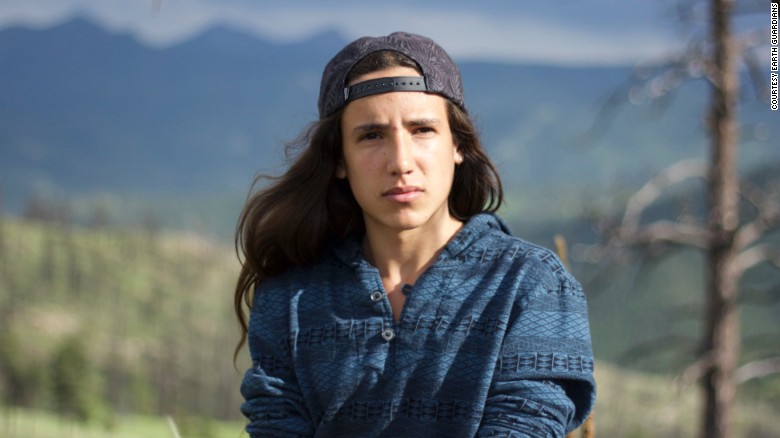On Monday, after the climate summit opened with a bizarre version of the green-carpet Oscars, with presidents crawling out of fancy cars and looking for photo-ops (why weren’t any of them riding bikes!? I would have loved that), U.S. President Barack Obama, a defendant in the 15-year-old’s lawsuit, gave one of the most anticipated speeches of the summit.
“I’ve come here personally, as the leader of the world’s largest economy and the second-largest emitter, to say that the United States of America not only recognizes our role in creating this problem, we embrace our responsibility to do something about it,” Obama said.
“Over the last seven years, we’ve made ambitious investments in clean energy and ambitious reductions in our carbon emissions. We’ve multiplied wind power threefold, and solar power more than twentyfold, helping create parts of America where these clean power sources are finally cheaper than dirtier, conventional power. We’ve invested in energy efficiency in every way imaginable. We’ve said no to infrastructure that would pull high-carbon fossil fuels from the ground, and we’ve said yes to the first-ever set of national standards limiting the amount of carbon pollution our power plants can release into the sky.”
Obama also was expected to join billionaire Bill Gates in announcing an international group of investors and governments to fund development of clean-energy technologies.
I see that as a very encouraging development. (And I got to ask Gates one of the questions you guys sent via Snapchat … look for more on that soon.)
But Tonatiuh, who I met over the weekend, more or less predicted what Obama would say. As an 8-year-old (this kid is the Doogie Howser of climate activism, I swear, and, yes, I know that ’80s TV reference is dating me) he campaigned for Obama. But he’s getting antsy in his mid-teens. He knows the Obama administration has pushed to make vehicles more efficient and clean up coal-fired power plants. He’s seen the country’s climate pact with China, with the world’s two largest polluters pledging — and this would have been unheard of not many years ago — to slow and reverse their emissions of global warming gasses.
But he also knows it’s not enough to meet the world’s goal of limiting warming to 2 degrees Celsius above preindustrial levels. To do that, we need to ditch fossil fuels completely.
Obama has “said it before, that climate change is one of the most pressing issues of our time,” Tonatiuh told me. “That, in his lifetime, he wants to see the slowing of the rising seas. We’ve all seen that speech. Talk is cheap. I wanna see concrete action and concrete promises from our country — and commitments for action on climate change.”
He’s only 15, mind you.
But he’s already thinking about his kids.
“The reason we are fighting for this is because of the world we want to grow up in, and the world we want our children and grandchildren and great-grandchildren to grow up in,” he said. “This is not a selfish cause. We’re not politically invested, we’re not financially invested. … We are in this because of the way it affects the state of the planet we want to be left with. That is the most noble cause I’d say: Leaving our children a better planet than the one we are living in today. We are doing our part. We need political leaders to step up and do theirs.”
The first day of the COP21 summit was filled with lots of what Tonatiuh, and many other activists, are sick of: talk. “We have the knowledge, the tools and the money — only 1.7% of global annual consumption would be required to put us on the right low carbon path for 2030,” said the UK’sPrince Charles. “The science is clear,” said U.N. Secretary-General Ban Ki-moon. “Even a 2-degree rise will have serious consequences for food and water security, economic stability and international peace. That is why we need a universal, meaningful agreement here in Paris.”
We absolutely need that agreement.
And discussion must precede it, of course.
I’m optimistic these talks will succeed where so many have failed. (The reason the summit is called COP21 is this is the 21st time we’ve done this.) But I’m so glad that, despite the Paris ban on mass demonstrations following the November 13 terror attacks, smart young people like Tonatiuh, who is a hip-hop artist and activist inspired by Aztec traditions, are here to lend their voices to the process.
“Let there be no doubt,” Obama said Monday, “the next generation is watching what we do. … I want our actions to show that we’re listening.”
“For I believe, in the words of Dr. Martin Luther King Jr.,” he continued, “that there is such a thing as being too late. And when it comes to climate change, that hour is almost upon us.”
No one realizes that more than young people like Tonatiuh.
Those of us beyond our teens must listen and then look inward.
Are our actions enough that we can say to future generations: We did everything we could to slow this steamrolling crisis — to save countries like the Marshall Islands from rising seas; to prevent unnecessary heat waves, droughts and wildfires; to make sure millions don’t fall into poverty and watch their crops fail because of our greed?
If not, what does that say about us?
As reported by CNN

